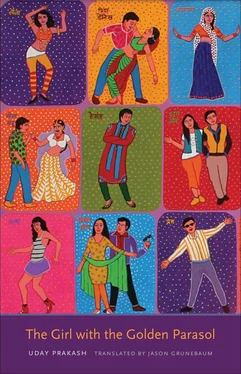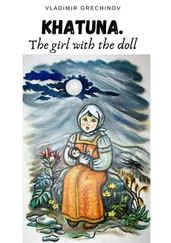“Which division did you score?” Mishra asked, sizing up Rahul for the first time.
“First, sir!” Rahul said. ““Same in graduation.”
Rahul clearly saw the smile wiped clean from Mishra’s face, replaced by an expression signifying the arrival of indigestion. Gopal Dwivedi at once sensed the change and tried to rescue the moment. “I consider him my younger brother, sir, and as such he shall always require your good grace. He will give his last breath to carry out any command you may give. Take this as my oath — sir!”
The squat frame of that blubbery, buffalo-like creature showed signs of delight for the first time. Under the flared nostrils of his pug nose, a sad excuse for a chuckle emerged from his fixed, fat lips, while his stomach, the size of a Laotian jar, rippled as if it’d been tickled.
Gopal Dwivedi seized the moment and placed a largish clay pot sealed in a plastic bag on a table beside the acharya: “I went to town at daybreak, and by chance found Vajravasi’s shop open. Pandit Jagannath-ji himself called me inside, and absolutely insisted I take this,” Gopal Dwivedi said.
“Shakun! Shakuntalaaaaaa! Have some chai sent for these boys!” Raga Jaijaivanti emerged from the acharya’s lungs, but with no attention to the melody. For the first time, Rahul felt like things might go his way. Gopal Dwivedi had informed him that if the acharya served them tea, they were as good as gold.
“Our department is full of politics,” the acharya announced. “Tell him that his energies should be focused entirely on his research. If he encounters any difficulties, he should liaise straightaway with me or Gopal. No need to involve anyone else. And about tomorrow morning: he should bring his application forms here to me at ten o’clock sharp. By the way, what kind of shape is your thesis in?”
“Only a couple of chapters left, sir. I should have it done by the end of the month. If it weren’t for my sister’s wedding, I’d be done by now!”
“Yes, of course, I understand. But you should speed things up. I’m feeling pressure to post the results. As long as I’m still around, things can still happen. After me, it’s Radha Raman’s turn. A real Kanyakubj Brahmin, that one. Pandit Suryakant Tripathi-ji says Raman bites the hand that feeds him. A total ingrate. Meanwhile, every day he’s plotting against me with the vice-chancellor. Even our dear Agnihotri-ji is encouraging these elements,” the acharyaji said maliciously.
Then for the first time he softened toward Rahul. “You have an interest in literature. Outstanding. Tell me, what have you read so far? Poetry or prose?”
“A little bit of both, sir-ji!” Who knows why Rahul had the burning desire to add the honorific “ji” after “sir.”
“I see. And the names of some writers? Their works?”
“Sir, Dostoyevsky’s Crime and Punishment, Tolstoy’s War and Peace and Resurrection and short stories. Old Man and the Sea and Tagore’s Gora, Gitanjali, The Home and the World, Garcia Márquez’s Love in the Time of Cholera, Milan Kundera’s The Joke, Italo Calvino’s Adam and Eve, Arundhati Roy’s God of Small . .”
“So! Even supermodels are writing modern novels these days, eh? I haven’t read anything by her but I’ve seen that Arundhati on TV in her ad for Lux soap. No doubt. She was Miss World, no? And who wrote that Old Man? It rings a bell,” the acharya queried.
“Hemingway did, sir! Ernest Hemingway. And sir. .” Rahul wanted to go on but the acharya cut him short.
“In addition to Western literature, have you read anything Indian?”
“Yes, sir! I’ve read Premchand’s novels, Nirmal Verma’s The Last Wilderness, Alka Saraogi’s Kali-Katha: Via Bypass, and Vinod Kumar Shukla’s The Servant’s . .”
“What about early Hindi verse? Ghananand, Matiram, Bihari, Dev?” the acharya asked.
“No, sir!”
“No Alam, no Bodha?”
“No, sir.”
“. . and Vidyapati and Surdas and Tulsidas. .?”
“I’ve heard of Tulsidas-ji, sir. I saw Ramanand’s Ramayana TV series, and where I’m from they put on a really great Ram Lila every year around Dusshera. And my mom knows the Sundarkand part by heart.”
“Outstanding. Come tomorrow. But if you want to study Hindi deeply then go to the library today and begin reading Ramchandra Shukla’s A History of Hindi Literature. ”
“Which Shukla-ji, Sir?” Rahul blurted out nervously.
“Ha! You. . ha!” the acharya laughed. “Gopal will tell you everything you need to know. A very intelligent student, he is.”
“Yes, sir!”
After finishing their chai, Rahul and Gopal Dwivedi left and took the road back. Dusk had fallen. Shadows faded. Darkness slowly descended.
“Thank you, Gopal-ji. Thank you so much,” Rahul said.
Gopal teased him. “An empty ‘thank you’ isn’t going cut it, Rahul-ji. After you get admitted, you’ll have to buy a big box of sweets to celebrate.”
“Certainly! Certainly! Have faith in me, Dwivedi-ji.” Rahul was very happy.
But then Gopal added, “I’m only worried about one little thing. Do you think he — might there have been any confusion about you?”
“What do you mean?” Rahul didn’t understand.
“Nothing. I’ll take care of it. What I meant was confusion about caste,” Gopal said lightly.
Rahul looked toward the sky. The clouds that gather in the evening pour out their rain late into the night. And it would rain tonight. The face of the acharya Shyam Narayan Mishra flashed around in Rahul’s head.
Kinnu Da’s voice returned. “For thousands of years, countless castes, ethnicities, and cultures kept coming to this country and living in peace. The Scythians, the Huns, the Mongols, the Kushans. Would you be able to find and differentiate all those different groups today?” Kinnu Da asked.
Then he said something Rahul would never forget. “Take any Indian middle-class family, this thing everyone’s talking about these days — one that lives in one of the identical Indian metropolises and lives very comfortably. Choose one that has four generations living under one roof, from grandparent to grandchild. Assemble them and take a Grand Family Photograph, just like they do right before ‘The End’ of a Bombay film. Then enlarge that photo and do a morphological analysis. . Ha!” Kinnu Da burst out laughing.
“Do you know what you’ll find? That one family photo opens up thousands of years of Indian history and places it right at your feet. ‘As is the individual, so is the universe’: yat pinde tat brahmande. It’s entirely probable that all of the descendants and offspring of all ethnicities and castes that once upon a time came to this great land will be represented by one single photograph of a middle-class family. But keep in mind there’s a part of our society afflicted with a superiority complex. The Great Indian Puritanical Sectarian Casteist Hedonist Homogeneous Middle Class. In that same family you’ll find a white, a black, a light brown, a dark brown, a flat nose, a big lips, a long and thin nose, a round eyes, a fine brow, a yellow face. Ha! Everything’s mixed in there. The Aryans, Dravidians, Africans, Mongols, Austric, everything.”
Kinnu Da grew serious. “In the history of this country’s civilization, there was never any voodooland cut off from the rest of the world like in the Andaman Nicobar islands or in Africa or today in the Americas. Here, countless newcomers kept on coming, and once they came, they stayed. Something like 13 to 87 percent of genetic interaction occurred right here. Do you understand the meaning of ‘genetic interaction’? It’s a relic from an age when there was no AIDS and no condoms! Ha!”
Читать дальше












